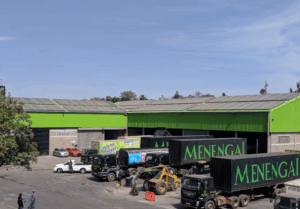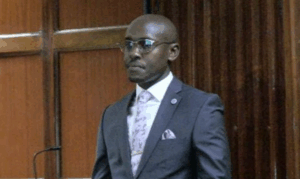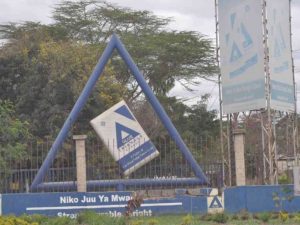ICT Authority launches Free Public Wi-Fi for Wakulima Market Traders

The Government of Kenya through the ICT Authority today launched Free Public Wi-Fi at Wakulima Market situated in Nairobi County’s Muthurwa area. The initiative presided over by Cabinet Secretary for ICT & the Digital Economy, Hon Eliud Owalo aims at enabling the public access to affordable, efficient, fast, and reliable internet that is vital for economic and educational development.
The launch of public Wi-Fi hotspot at Wakulima Market follows November’s launch of a similar successful initiative at Nairobi’s City Market with today’s event coinciding with the 2022 Jamhuri Day celebrations where technology and innovation took centre stage under the theme: Innovate, inspire and connect in line with government’s agenda of prioritizing universal internet provision to the citizenry.
The Cabinet Secretary for ICT & the Digital Economy, Hon Eliud Owalo, was accompanied by national government Leaders as well as the political leadership of Nairobi County including among others the Nairobi County Governor, Johnson Sakaja. Speaking at the event, Hon Owalo noted that this launch comes at a time when the Government of Kenya is paying unprecedented attention to facilitating improved livelihoods for Kenyans in every sector of the economy while emphasising that access to affordable, stable and safe Internet is a critical integral enabler, in this regard.
“My ministry is committed to providing e-government services and software solutions to the people’s abiding needs. We are going to move from one corner of the country to the other, not only ensuring that our proposed extra 100,000 km of fibre optic cable is being laid out, but also that we are enabling Kenyans to access the superhighway through Government funded hotspots. The success of the recently launched Hustler Fund, for example, depends heavily on functional digital technology, everywhere in the country. My ministry is, accordingly, focused on availing this technology to every Kenyan, regardless of where they may be in the country,” he said.
In his closing remarks, Hon Owalo assured Kenyans that their information and Communication Technology Authority (ICTA) is doing everything possible to enhance Internet security, so that your information is not abused online. He called upon the citizenry to make good use of the facility to make the digital economy a reality while urging the County Governments, other Government Departments and Agencies, as well as development partners to join and collaborate with the ICT Authority to provide internet access through this initiative.
Ceo-ICT Authority, Stanley Kamanguya in his speech remarked that the ICT Authority is on course to roll out ICT infrastructure across the country highlighting that Kenya currently has six submarine cables and 8,900 km of fibre optic cable connecting key government institutions in both National and County Governments.
“So far 1,650 key public institutions and offices have been connected. In Nairobi, the ICT Authority has implemented the Government Core Central Network intended to serve as a shared and secure service that seeks to improve the exchange of information across Government institutions. The ICT Authority also has plans to install (25,000) internet hotspots in business centres, rural areas and other public spaces. We believe that this will go a long way in enabling local businesses to tap into the opportunities presented by the internet. We shall also be embarking digital skills training and internet security awareness to ensure that individuals and small businesses effectively but also securely utilize the internet connectivity facility,” he said
Mr Kamanguya further noted that the ICT Authority has developed the Kenya National Digital Master Plan (2022-32) which is the framework for the structured delivery of ICT in Kenya. This will enable Kenya fully harness the benefits envisioned from the heavy investment made in ICT infrastructure by removing the hurdles faced by users in accessing the internet that includes among other factors significant high cost and accessibility in remote areas.
According to Mr Kamanguya, Digital Infrastructure and Digital Services are two of the key pillars in the Master plan. Through these pillars, they intend to not only provide connectivity infrastructure to citizens as well as public and private institutions but also deliver services online. The free Public Wi-Fi programme thus envisaged increased internet access for our citizens to enable them to engage in more economic activities and improve their well-being.
“Through this initiative, we shall also enhance internet access in the unserved and underserved areas as well as disadvantaged groups thus reducing digital divide, and enhance equity and fairness,” he said








